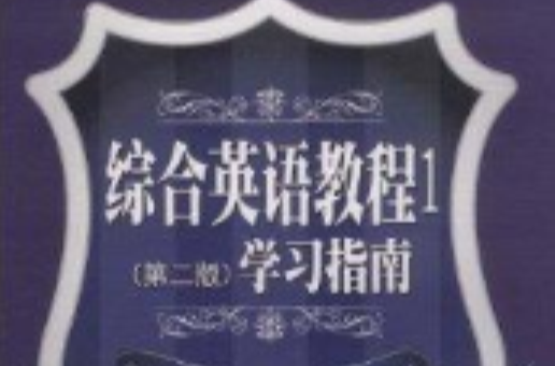《綜合英語教程1(第2版)學習指南》是《綜合英語教程1(第二版)》(黃源深、虞蘇美總主編,鄒為誠主編)的教學輔助用書。該書分“說、讀、寫”三大板塊對《教程》的學習和使用進行輔導。在“說”板塊,編者根據《教程》的交際要求,編寫了兩篇以上模擬對話(Made-up Conversations),對話反映的內容與時俱進。在“讀”板塊,編者重點對學生閱讀能力的提高進行了“課文分析”(TextAnalysis)、“課文l背景注釋和語言難點中英文解釋”(Notes to the Text)、“語言點講解”(Language Points in the Text)、“課文參考譯文”(Reference Chinese Versions of the Texts)。在“寫”板塊,外籍參編人員根據《教程》要求就全書l 5個單元的句子寫作給出了參考答案並寫出了15篇以上短文(Sample Writing)。最後還提供了一些重要練習和有一定難度的練習的參考答案(Keys to the Exercises)。
基本介紹
- 書名:綜合英語教程1學習指南
- 出版社:西南交通大學出版社
- 頁數:229頁
- 開本:16
- 品牌:西南交通大學出版社
- 作者:吳樹奇
- 出版日期:2010年9月1日
- 語種:英語, 簡體中文
- ISBN:9787564308544
內容簡介
圖書目錄
Part I. Made-up Conversations (Try to speak more)
Part II. Reading Comprehension and Language Activities
Part III. Reference Chinese Versions of the Texts
Part IV. Sample Writing
Part V. Keys to the Exercises
Unit 2 American Homes and British Homes
Part I. Made-up Conversations (Try to speak more)
Part II. Reading Comprehension and Language Activities
Part III. Reference Chinese Versions of the Texts
Part IV. Sample Writing
Part V. Keys to the Exercises
Unit 3 What Is in a Name?
Part I. Made-up Conversations (Try to speak more)
Part II. Reading Comprehension and Language Activities
Part III. Reference Chinese Versions of the Texts
Part IV. Sample Writing
Part V. Keys to the Exercises
Unit 4 Doing Away With the King's English
Part I. Made-up Conversations (Try to speak more)
Part II. Reading Comprehension and Language Activities
Part III. Reference Chinese Versions of the Texts
Part IV. Sample Writing
Part V. Keys to the Exercises
Unit 5 England as Seen by Americans
Part I. Made-up Conversations (Try to speak more)
Part II. Reading Comprehension and Language Activities
Part III. Reference Chinese Versions of the Texts
Part IV. Sample Writing
Part V. Keys to the Exercises
Unit 6 The First Day at School
Part I. Made-up Conversations (Try to speak more)
Part II. Reading Comprehension and Language Activities
Part III. Reference Chinese Versions of the Texts
Part IV. Sample Writing
Part V. Keys to the Exercises
Unit 7 Computers .
Part I. Made-up Conversations (Try to speak more)
Part II. Reading Comprehension and Language Activities
Part III. Reference Chinese Versions of the Texts
Part IV. Sample Writing
Part V. Keys to the Exercises
Unit 8 The Missing Monarchs
Part I. Made-up Conversations (Try to speak more)
Part II. Reading Comprehension and Language Activities
Part III. Reference Chinese Versions of the Texts
Part IV. Sample Writing
Part V. Keys to the Exercises
Unit 9 The Risks of Life
Part I. Made-up Conversations (Try to speak more)
Part II. Reading Comprehension and Language Activities
Part III. Reference Chinese Versions of the Texts
Part IV. Sample Writing
Part V. Keys to the Exercises
Unit 10 Words Can Give You Power
Part I. Made-up Conversations (Try to speak more)
Part II. Reading Comprehension and Language Activities
Part III. Reference Chinese Versions of the Texts
Part IV. Sample Writing
Part V. Keys to the Exercises
Unit 11 The Transaction
Part I. Made-up Conversations (Try to speak more)
Part II. Reading Comprehension and Language Activities
Part III. Reference Chinese Versions of the Texts
Part IV. Sample Writing
Part V. Keys to the Exercises
Unit 12 The Message Behind the Smile
Part I. Made-up Conversations (Try to speak more)
Part II. Reading Comprehension and Language Activities
Part III. Reference Chinese Versions of the Texts
Part IV. Sample Writing
Part V. Keys to the Exercises
Unit 13 A Delightful Village
Part I. Made-up Conversations (Try to speak more)
Part II. Reading Comprehension and Language Activities
Part III. Reference Chinese Versions of the Texts
Part IV. Sample Writing
Part V. Keys to the Exercises
Unit 14 The Mystery of the White Gardenia
Part I. Made-up Conversations (Try to speak more)
Part II. Reading Comprehension and Language Activities
Part III. Reference Chinese Versions of the Texts
Part IV. Sample Writing
Part V. Keys to the Exercises
Unit 15 For or Against Smoking in Public Places
Part I. Made-up Conversations (Try to speak more)
Part II. Reading Comprehension and Language Activities
Part III. Reference Chinese Versions of the Texts
Part IV. Sample Writing
Part V. Keys to the Exercises
References
文摘
在美國,許多年輕人不和家人住一起,而是住在居民區的公寓樓,在這裡大家差不多都是同齡人。年輕人常常一畢業就離家搬進合租公寓(如果能付得起錢的話)。他們自己做飯洗涮,偶爾周末也回家看看。
年輕已婚夫婦可能會搬到新興的郊區,那裡多數都有小孩。在鄉間,有些人甚至自己蓋房子住。
如果一家收入高,他們也許會搬至另一個郊區,那裡房子更大,有兩個甚至三個車庫,一個游泳池,一個孩子們的遊藝室,還有家庭可能需要的一切。
老年人通常不和他們的成年孩子住在一起;不少老人住在養老院。一些則住在專為老人建造的小城鎮裡,那裡沒有小孩,環境要安靜些。
美國人總是在搬家。有些家庭每隔幾年就要搬一次,每年有20%的美國人要搬家。舒茨夫婦開始一起生活可能是住在紐約的公寓房裡,接下來住在新英格蘭的一座白色木屋裡,木屋只有小小的窗戶,冬天能避寒。退休後他們搬到加利福尼亞州的一座陽光明媚的房子裡,花園裡種著柑桔樹,大大的窗戶將游泳池和大海美景盡收眼底。
英國家庭
英國人的家通常比美國人家小一些,但是,和美國人的家一樣,老年人、年輕家庭和未婚青年通常不住在一起。
許多英國人喜歡老房子,這些房子通常要比新房子還貴。英國人也喜愛園藝,小鎮小村里乃至郊外花園隨處可見。一些花園很小,只有一棵樹,幾朵花,有些花園很大,有好多花兒,還有不少蔬菜和果樹,足夠一家人吃。
英國有1900萬座房子一大房子和小房子,舊的村舍和新高層建築,獨家獨院房子和公寓(美國人說apartment,英國人說flat)
在英國,半數家庭擁有自己的房子。他們的房子是一樣的,都有兩間或三間臥房在樓上,樓下一間起居室、一問餐廳和廚房,房子前後各有一個小花園。房主付款買房是先從“住房基金會”貸款,然後再每月一點點地償還。
三分之一的英國人租借國有房子者被稱為“市政房子”,不少這樣的房子是公寓的但有些也是獨家獨院,有一個小花園,其他人則是向私人房東租房子。
英國人有大量各式各樣的房子,但這還不夠!有些年輕人結婚成家時可能很難找到一處房子。
序言
縱觀《指南1》書中的各大輔導板塊,不難發現該書有以下幾個特點。
一、針對性強
《指南1》基於教授《教程1》的一線教師幾年來的教案,其輔導板塊的設計、輔導內容的挑選、對講解的難易程度的把握等均針對語言能力、語用能力不太強的西部二本學校英語專業學生及社會自學人士。對以上學生而言,做到“脫口而出”並非易事,《指南1》各單元的模擬對話可助學生縮短準備時間,稍作替換便可進入口語活動。這樣可以逐步提高學生的語用能力。另外,《指南1》的第二、三部分提供的語言知識註解可以幫助學生打牢語言基礎,逐步提高他們的語言能力。二、時代氣息濃
《指南1》中編選的一些語言材料與時俱進。在輔導學生“說”的過程中,編者自然引出一些現實生活中正在發生的事,如“世博會”等。這有助於學生在學習語言的同時也能把握時代的“脈搏”,提高他們的學習積極性。
三、擴展型學習和傳統型學習兼顧
《指南1》全書在輔導學生學習的過程中,較好地處理了擴展型學習和傳統型學習的關係。首先,各單元有大量注釋可擴大學生的知識面及套用能力。如“說”的部分給學生增補了國內一些名勝的英語表達;“讀”的部分有大量的背景知識介紹和作品分析:“寫”的部分所提供的範文涉及到除英、美之外的其它國家的文化風情。與此同時,《指南1》也注重傳統的學習方式。如各單元的辭彙注釋可幫助學生全面地掌握這些重點單詞和習慣用語,提高他們的語言悟性。
鑒於《指南1》的以上三大特點,我想該書一定會得到使用和學習《教程1》的師生的認可。誠然,《指南l》非名家大作,但對這些長期在一線教學的教師能積極參加教研、主動為學生著想本人表示欽佩和讚賞。雖然他們的作品中可能會有不足之處,有的問題可能考慮得還不夠周密,鑒於他們積極的工作態度,這些都是可以諒解的。

